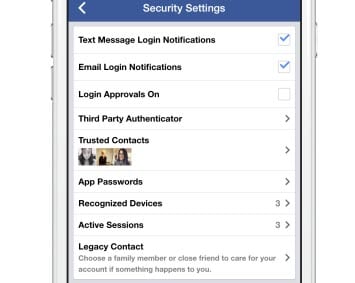Facebook’s latest “after-life” account policy
If you’ve been hearing rumours that Facebook will allow accounts belonging to people who have died to continue posting then you’ve heard right. Well, sort of.
It’s certainly not an issue Mark Zuckerberg thought he’d have to tackle in the early days of Facebook we’re sure, but what the site does with accounts belonging to people who have passed away has become quite a controversial topic.
It probably didn’t help when Facebook users complained that their deceased loved ones were continually being displayed in advertisements, or had Facebook apps posting content from their accounts. One user even complained that Facebook prompted her to “get re-acquainted” with an account of a relative who had died.
Facebook’s latest answer to this delicate issue is the “Legacy Contact”. In fact, users now have the option of having a legacy contact or just deleting your account.
A legacy contact is a person chosen by an account holder to manage their account after they have died. Upon satisfying Facebook’s criteria to prove that someone is in fact dead (it sounds callous, to need to prove this, but you can see why Facebook have to do it) the legacy contact is given control of the account belonging to the deceased.
But it’s not full control. The legacy contact won’t be using the account as if it belonged to them. Actually it’s nothing like full control at all – the legacy contact will not even be able to take the guise of the account holder.
The legacy contact will be able to accept friend requests, change the profile and cover photo of the account and write a special type of “memorial post” that will appear at the top of the account timeline. Also, if permission was given, the legacy contact can download photos and posts made by the account holder. However private messages remain private.

For accounts that have it enabled, it will appear in the Security settings.
Currently only available as a trial to select accounts in the US, we fully expect the feature to embark on its usual staggered roll-out imminently.
So now not only do you have to pick the beneficiaries to your estate, or the people to take care of your children should something happen, now you get to pick a legacy contact for your Facebook account as well. But only if you want to, of course.
Many users who don’t feel like their time on this Earth is quite up yet may try and avoid this rather morbid feature. After all, it’s sort of akin to writing your will. No one really wants to think too hard about what happens after you die, especially if you’re young.
But for those who think it’s a good feature, it’s time to get thinking. Who do you want to manage your Facebook account after you die? Who is your legacy contact?
Learn more about the feature from Facebook here.
Continued below...
Thanks for reading, we hope this article helped, but before you leave us for greener pastures, please help us out.
We're hoping to be totally ad-free by 2025 - after all, no one likes online adverts, and all they do is get in the way and slow everything down. But of course we still have fees and costs to pay, so please, please consider becoming a Facebook supporter! It costs only 0.99p (~$1.30) a month (you can stop at any time) and ensures we can still keep posting Cybersecurity themed content to help keep our communities safe and scam-free. You can subscribe here
Remember, we're active on social media - so follow us on Facebook, Bluesky, Instagram and X
